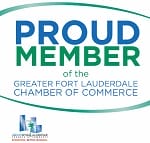By Buddy Nevins
Photography by Gary James
The Fort Lauderdale that Lee Feldman remembers best is Spring Break, the bacchanalia that brought the nation’s college students to the beach for rowdiness, drinking and hookups. “It was the 1980s. The drinking age was still 18 [in Florida]. I was a popular guy because you could stay at my house and go to Spring Break,” recalls Feldman, who is from North Miami Beach.
Although he didn’t know it back then, three decades later he would become the city manager of Fort Lauderdale. Today, he is running a community that boomed economically when it deliberately killed the Spring Break that he loved in the mid-1980s. Fort Lauderdale now is upscale tourism, a multibillion-dollar marine industry with plans to turn itself into a thriving urban residential and employment center for South Florida.
Feldman works in a corner office at City Hall at a desk filled with the minutia of government: flow charts, budget books and consultant reports. A veteran city manager with a public policy degree from Washington and Lee University, Feldman, 52, ran two smaller Florida towns before moving to Fort Lauderdale in June 2011. The lower half of one wall features a large poster with a list of “25 Reasons to Say No.” Reason No. 1: “We tried it before and it didn’t work.” On the wall behind his desk is a clock with backward numbers, hung, he says, as a “reminder to look at things differently.” A bookcase has a small collection of books he bought on eBay about city government dating back to the 1880s. “They dealt with the same stuff—delivering services efficiently,” Feldman discovers by reading them.
His life is dramatically different from what it was in May 2001 when he was city manager of North Miami and collapsed while attending a convention at the Fort Lauderdale Marriott Harbor Beach Resort. A heart attack at 39 was a life changer. “I was entering a session, and I just didn’t feel well,” Feldman recalls. He had a pain shooting up his left arm, and he was sweating. He walked over to Terry Stewart, then the assistant city manager of Pembroke Pines and a former paramedic. Stewart called 911.
Instead of feeling sorry for himself, Feldman used the experience to become a better manager and person. Today, Feldman says he is less frenzied, less uptight, less bothered by the day-to-day. “I took any questioning as criticism against me,” he says. “I personalized everything. Today I realize that it’s just business,” and the questions he’s asked can actually improve his final decisions.
The biggest challenge Feldman is tackling is ensuring that Fort Lauderdale develops as planned. Every new building must have his approval. “Sometimes I talk to developers more than I talk to my wife… We try to work with them. Hopefully, we approach all this as partnerships, [however] they have to recognize when and why we say, ‘no.’”
Fort Lauderdale wants to solidify its role as the downtown of Broward County, Feldman says. Around 3,000 more housing units are in the pipeline. Hundreds of new apartments are already open in Flagler Village and on the south side of the New River. Surveys show that millennials and empty nesters are moving in, which is fine with Feldman. He wants Fort Lauderdale to have enough people living downtown “to attract more offices, more retail, more restaurants, more entertainment… We want a vibrant downtown urban core that doesn’t shut down at 5 or start up at 9… I am a firm believer that a rising tide raises all boats. With all the activity downtown, we are going to see economic development across the city suitable to each neighborhood.”
Key to the future, Feldman says, are “game-changing” transportation projects: the Wave Streetcar would carry passengers around downtown; the passenger train All Aboard Florida would connect Fort Lauderdale with Orlando; the existing commuter Tri-Rail would shift its trains eastward so that they’d run on the Florida East Coast tracks right through downtown.
Business folks and Fort Lauderdale’s politicians are thrilled with Feldman’s foresight. Mayor Jack Seiler is one of them: “We’re going through all this economic growth and development. Lee is just what we need. He has vision.”
When he is not thinking about tomorrow’s Fort Lauderdale, Feldman, the father of three daughters, likes to take in a play or see an exhibit at NSU Museum of Art Fort Lauderdale. But his favorite pastime is fantasy baseball and football, which is no surprise because it plays to his skills. “I can’t play, so I might as well manage teams,” he says, smiling. “I like managing.”
Originally appeared in the Winter 2014 issue.




